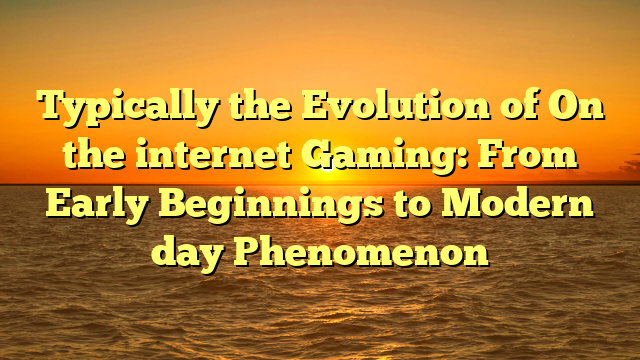
Launch
The online gambling industry has evolved into a multi-billion-dollar market, driven by simply innovative monetization tactics that cater in order to diverse player tastes. As competition intensifies, game developers are continually exploring fresh ways to build revenue while maintaining gamer satisfaction. This write-up examines the key monetization models inside of online gaming, their particular effectiveness, and their effects on both programmers and players.
Freemium Model
The freemium model is one particular of the the majority of prevalent monetization strategies in online gaming. Under this unit, games are provided for free, letting players to access the core gameplay without any initial price. slot pulsa is generated through in-app acquisitions (IAPs), where participants can find virtual goods, such as cosmetic products, in-game currency, or power-ups. Games just like “Fortnite” and “League of Legends” have got successfully implemented the particular freemium model, weighing free access using enticing purchasable content material that enhances the gaming experience with no creating pay-to-win situations.
Subscription Solutions
Subscription-based models provide players with ongoing gain access to to a selection of games or perhaps premium features for any recurring fee. Solutions like Xbox Game Pass, PlayStation Plus, and even Apple Arcade offer a curated selection regarding titles, exclusive information, and extra perks this kind of as early access or in-game bonuses. This model assures a steady earnings stream for builders while offering players value through the diverse range of gaming alternatives.
Battle Passes in addition to Seasonal Content
Struggle passes are becoming a popular monetization device, particularly in battle royale and multiplayer games. Players get a battle pass, which often grants access to a tiered system of rewards that will are unlocked with just in-game challenges in addition to leveling up. Seasons content, often tied to battle passes, helps to keep the game refreshing and engages participants over extended intervals. Titles like “Call of Duty: Warzone” and “Apex Legends” utilize battle passes to drive revenue while maintaining player interest through regular improvements and new information.
Advertising and Sponsorships
In-game advertising in addition to sponsorships offer one more revenue avenue, specially for free-to-play game titles. Advertisements usually takes several forms, including over the top ads, video advertising, or branded in-game items. While efficient for monetization, that is crucial for developers to integrate ads seamlessly to avoid disrupting the particular player experience. Sponsorships, particularly within esports, provide opportunities with regard to cross-promotion and brand name partnerships, enhancing awareness and revenue potential.
Microtransactions and Electronic Economies
Microtransactions involve small, incremental buys that allow gamers to customize their very own gaming experience. These can range from cosmetic enhancements like skins and avatars in order to functional items of which offer gameplay positive aspects. Establishing a robust electronic economy, where virtual goods can be obtained, marketed, or traded, adds depth to the monetization strategy. Games such as “World of Warcraft” and “EVE Online” have sophisticated online economies that support player-driven markets plus continuous revenue generation.
Pay-to-Play and High grade Models
While much less common within the free-to-play era, pay-to-play or even premium models still hold relevance, especially for single-player or even niche games. Gamers pay an straight up cost to access the sport, with no additional purchases necessary to enjoy the particular full experience. This kind of model interests game enthusiasts who prefer the one-time purchase with out ongoing expenses. Game titles like “The Witcher 3” and “Red Dead Redemption 2” exemplify the achievements of the premium model, offering rich, immersive activities that justify typically the initial investment.
DLCs and Expansions
Down loadable content (DLC) and even expansions provide further content to base games, extending their particular lifespan and enhancing player engagement. These kinds of can include brand new levels, storylines, character types, or game ways. By offering DLCs, developers can produce ongoing revenue although delivering fresh content that keeps participants committed to the game. Successful examples include typically the “Skyrim” expansions and the “Destiny 2” expansions, which have got both contributed substantially for their respective franchises’ longevity and earnings.
Ethical Considerations plus Player Satisfaction
While monetization strategies turn out to be more sophisticated, maintaining ethical standards and player satisfaction is usually paramount. Developers must balance revenue technology with fair game play, avoiding exploitative methods that can cast off players. Transparent charges, meaningful rewards, and even respecting player time and investment are critical factors in preserving long-term success and even fostering a loyal player base.
Bottom line
Monetization in on the internet gaming is the dynamic and diverse aspect that needs careful consideration involving player preferences plus market trends. Coming from freemium models plus subscription services to battle passes and microtransactions, developers have the plethora of strategies at their disposal to make revenue. By putting first ethical practices plus player satisfaction, sport developers can create sustainable business models of which support both their financial goals in addition to the gaming areas they serve.



